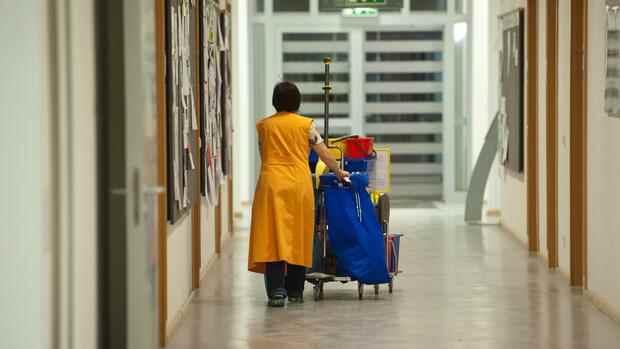If the increase to twelve euros comes this year, a number of collectively agreed industry minimum wages will be exceeded, some of which provide for lower remuneration beyond 2022. These have been declared generally binding by the Ministry of Labor, so that companies not bound by collective bargaining agreements also have to pay the wages.
This applies, for example, to the building cleaning trade with its almost 700,000 employees. There, the collective minimum wage for wage group 1 was raised from 11.11 euros to 11.55 euros gross per hour at the beginning of the year.
This is almost 18 percent above the currently applicable statutory minimum wage of 9.82 euros. In January 2023, the industry minimum wage for building cleaners would rise to twelve euros. This would make it obsolete if a statutory minimum wage of twelve euros were to take effect this year.
Top jobs of the day
Find the best jobs now and
be notified by email.
“We have no illusions that the traffic lights are still distancing themselves from their plans, which mean the suspension of collective bargaining autonomy and sabotage of the minimum wage commission,” says the federal building cleaner’s guild master, Thomas Dietrich.
But with a view to existing collective agreements and for reasons of legal and planning security for the companies, some of which would have to adhere to long-term customer contracts, “at least we do not advocate the new statutory minimum wage coming into force before 2023”.
Higher minimum wages influence collective bargaining
Temporary work is also affected, which in 2012 – before the statutory minimum wage came into force in 2015 – introduced a generally binding minimum wage based on the Temporary Employment Act.
The minimum wage agreement that the industry associations BAP and IGZ concluded a good two years ago with the collective agreement for temporary work of the German Trade Union Federation (DGB) currently provides 10.45 euros as the lower limit. The ordinance of the Ministry of Labor, which makes the industry minimum wage mandatory for all companies, runs until the end of this year.
In April, the increase to 10.88 euros is due. The industry-specific minimum wage would thus be higher than the statutory minimum wage if this – as decided by the independent minimum wage commission – were increased to 10.45 euros on July 1 of this year.
The temporary employment industry now wants to wait for the labor minister’s draft law with the specific date for the increase. But: “There is no question that an increase in the statutory minimum wage to twelve euros will have an impact on our collective agreements and on the negotiations that are pending this year,” says Florian Swyter, General Manager of the Federal Employers’ Association of Personnel Service Providers (BAP).
The draft law on the minimum wage increase is to come “shortly”.
(Photo: Reuters)
However, the planned increase in the statutory minimum wage is also likely to have an impact on sectors in which the sector minimum wage is over twelve euros. Because the smaller the gap between the statutory and industry-specific lower wage limit, the louder the questions are likely to be whether the whole process for an industry minimum wage is worthwhile at all.
Because this has to be negotiated first, then the application process for the general applicability is pending, at the end the customs must be informed in order to be able to control any violations.
Wage expectations could rise
A higher statutory minimum wage could also raise trade unions’ expectations in negotiations on industry minimum wages. For example, the industrial union Bauen-Agrar-Umwelt (IG Bau) had already brought 14 euros into play before the collective bargaining negotiations on a new lower wage limit in the main construction trade with its almost 900,000 employees.
The old industry minimum wage agreement, which the union had already terminated at the end of September at the end of the year, provides for a lower limit of 12.85 euros. That is almost a third more than the currently applicable statutory minimum wage. This distance is necessary in order to find employees for the often very physically demanding work on the construction site, argues the union.
She accuses employers of having generally questioned the industry minimum wage in the first round of negotiations on December 2nd. In any case, the social partner wants to abolish the minimum wage II, which applies to skilled workers and is 15.70 euros. The negotiations will continue on January 27th and it cannot be ruled out that they will go to arbitration afterwards.
Purchasing power increase of almost 10 billion euros
IG Bau has just presented a study that, from their point of view, offers an argumentation aid for raising the statutory lower wage limit to twelve euros. “Overall, the statutory minimum wage will lead to an increase in purchasing power of around 9.8 billion euros a year,” said IG Bau boss Robert Feiger, citing a study by the Pestel Institute in Hanover.
Because if you only get the statutory minimum wage, you will have 2.18 euros per hour more in the wage packet than today on the day it climbed to twelve euros. And the additional money goes almost one-to-one into consumption among people with low incomes, emphasized Feiger, whose union also represents sectors with lower wages such as building cleaning and agriculture.
In any case, Minister of Labor Heil strongly recommended reading the Pestel investigation. Although he knew “that there are the usual objectors” against an increase in the minimum wage, he said on Monday. But he was determined to push through a wage increase for millions of employees even against resistance.
More: Head of the minimum wage commission: “I think twelve euros is okay”
